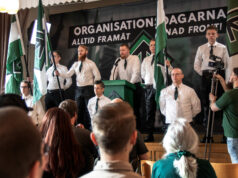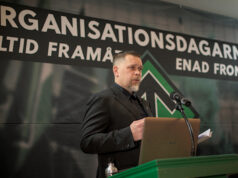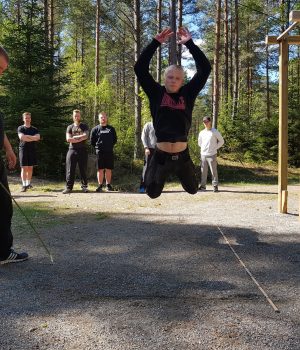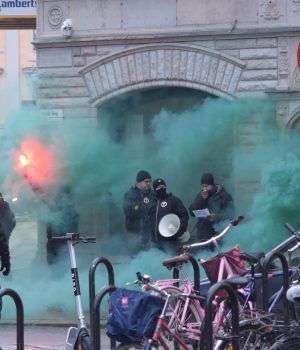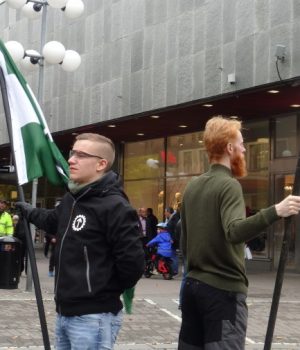FREE SPEECH. The Swedish Patent and Market Court has passed its verdict in the case of Nordfront versus the Swedish Academy, dismissing the lawsuit and ruling in favour of Nordfront and the Nordic Resistance Movement.
The Swedish Academy’s lawsuit concerned the use of quotes from classic works of literature on Nordfront.se and was originally brought against Nordfront and the Nordic Resistance Movement in December 2019. The Swedish Academy demanded that Nordfront and the Resistance Movement be forbidden from reproducing quotations from a number of classical literary works on Nordfront, and face a fine if they continued to do so.
The works in question were quotes from poems by the authors Viktor Rydberg, Verner von Heidenstam and Esaias Tegnér, in addition to extracts from the Hávamál, which were published on Nordfront.se.
The Swedish Academy justified the lawsuit by claiming that the works were “reproduced on the website… in connection with publications that can be considered to constitute crimes of incitement to racial hatred, and illegal depictions of violence”. Additionally, they stated that the works were presented side by side with depictions of “anti-semitism” and “Holocaust denial”.
The Patent and Market Court’s verdict was delivered on 15 April and dismissed the suit filed by the Swedish Academy as unfounded. The Swedish Academy will also have to pay the legal costs of Nordfront and the Nordic Resistance Movement, which amount to approximately one and a half million Swedish kronor.
The verdict consisted of more than 300 pages, most of which documented the case, with only the first 23 pages dealing with the legal reasoning of the Court in passing the verdict.
The Court begins by writing off three objections made by Nordfront and claims that the Swedish Academy is to be regarded as a government agency with the right to press charges concerning the Protection of Classics, that quotes can be regarded as reproductions and are thus to be covered by the Protection of Classics, and finally that the works in question are works of great significance. This final objection is also a criterion for the validity of the Protection of Classics. Nordfront had many other objections, but the Court writes that they did not need to examine all of these since the suit filed by the Swedish Academy was rejected based on the objection that the Protection of Classics does not apply to unaltered works.
In the verdict it states the following:
The statements made in the preparatory work concerning the extent of the Protection of Classics refer exclusively to works subject to adaptations, changes or distortions. In the Court’s view, there is nothing in the preparatory work suggesting that the Protection of Classics was also intended to encompass the reproduction of a work in an unaltered condition in a context perceived as offensive from a general cultural viewpoint. On the other hand, the context can be taken into consideration when judging whether a reproduction in an altered condition is offensive. The above-mentioned statements in the proposition regarding the coincidence of individual and public interests therefore cannot, in the view of the Court, constitute a basis for concluding that the Protection of Classics had also intended to prevent such reproductions. […]
In conclusion, this means that the preparatory work suggests that the Protection of Classics was intended to protect the original form of the literary or artistic work, by preventing certain types of alterations, and in this way serving to protect our common cultural heritage. On the other hand, it is not – as far as it is clear – designed to prevent reproductions of works in an unaltered condition.
The Court then writes that it would be problematic to interpret the law in question more extensively:
Creating further limitations of this principle via an extensive interpretation of Section 51 of the Copyright Act could have certain consequences for freedom of speech and freedom of the press that could be difficult to foresee and should typically be determined by the legislator. It urges us to be careful when assessing the scope of the Protection of Classics.
As such, the Patent and Market Court does not believe that reproducing a work in an unaltered condition should be prohibited in relation to the Protection of Classics, and that quoting a work is to be regarded as a reproduction in an unaltered condition. Thus, the Court concludes that the Swedish Academy’s suit cannot be upheld, since Nordfront has published quotes and not altered works.
At the time of writing, Nordfront’s legal representative, Henrik Johansson, was attending another court proceeding and did not yet have time to read the verdict. However, he told Nordfront that he was happy that the Court had reached the same conclusion as he did regarding the interpretation of the Protection of Classics on this decisive point.






